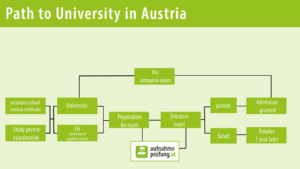Du willst keine Neuigkeiten mehr verpassen?
Melde dich für unseren Newsletter an, um das Starter-Kit (Checkliste, Kalender, Lernplan-Vorlage und Kursgutschein) und wöchentliche News zu Uni- und FH-Aufnahmetests, Gap Year & Co. zu erhalten.
Moving to a new country is extremely challenging – especially, if you don´t know the culture, the people and the overall system. Particularly for young people, the system of education is of great relevance and yet is sometimes difficult to understand. Therefore, we want to give you a quick and simple overview of the Austrian system of higher education.
First of all, it is crucial to know that there are universities and universities of applied sciences (Fachhochschulen or in short FH) in Austria. These are identical in some aspects, for example when it comes to study permits, however, there are some differences concerning theirs costs, admission and organization.
In order to study at Austrian universities or FHs, you either need to have a secondary school leaving certificate or passed the so-called Studienberechtigungsprüfung (study permit examination). Examples for valid secondary school leaving certificates are the Austrian Matura, the German Abitur, the Italian maturità, the French Baccalauréat, the Spanish Bachillerato or the British A-Levels.
You don´t have own a certificate as such? Don´t you worry! With the study permit examination you will still be allowed to start your studies. However, you need you fulfill certain requirements for you to be allowed to take the exam. Also these may vary from university to university. The requirements at the biggest educational institution of Austria, the University of Vienna, are the following:
Please note that the study permit examination only allows you to study one specific degree whereas a secondary school leaving certificate enables you potential access to any degree of your choice. Also, make sure you do not confuse the study permit exam with the entrance exam that some degrees have: You need the study permit to be allowed to take the entrance exam in the first place but it does not guarantee you a place at the university.
If you want to find more information about the study permit examination, check out the website of the University of Vienna.
At all public universities in Austria, the tuition fee depends on your citizenship: As an EU/EEA/CH citizen, you are required to pay the Students´ Union fee (20,70 Euros per semester). If it takes you longer than the minimum period of study + 2 extra semesters to finish your bachelor´s degree, you are also obliged to pay a tuition fee of 363,36 Euros in addition to the Students´ Union fee each semester (384,06 Euro in total).
At FHs in all federal states (except in Burgenland) you have to pay the Students´ Union fee and the tuition fee right from the very beginning (384,06 Euros per semester). However, there are numerous grants and subsidies so that an individual’s financial situation does not stand in the way of their studies.
All FHs in Austria have specific admission procedures. In order to get in your wished degree, you often have to go through multiple stages, which can include aptitude tests, practical tests and/or personal interviews.
At universities there is no standard procedure: The admission process depends on your degree and sometimes even differs from city to city. Law is one example of this as you have to take an entrance exam if you want to study in Vienna but you don´t if you want to study in Innsbruck. The biggest entrance exams in Austria are for medicine, psychology and business administration at WU Vienna. For the biggest and most selective admission procedures, we offer multiple preparatory courses:
Due to the fact that the admission procedures may vary each year and depend on the number of applicants, it is highly recommended to keep up to date with the latest information. On our website, we will inform you about any changes that might occur immediately.

Universities and FHs differ a lot regarding their structure and organization throughout your studies. While FHs have a pretty fixed timetable and often have compulsory attendance, universities give students a lot more freedom. At universities students are responsible for their semester planning, for most classes there is no attendance required and there is simply a higher reliance on an individual´s own responsibility.
Melde dich für unseren Newsletter an, um das Starter-Kit (Checkliste, Kalender, Lernplan-Vorlage und Kursgutschein) und wöchentliche News zu Uni- und FH-Aufnahmetests, Gap Year & Co. zu erhalten.